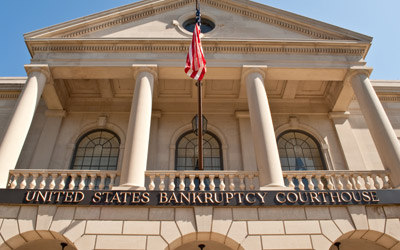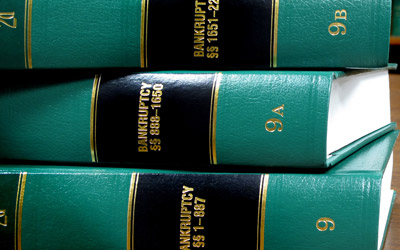Bankruptcy Articles
The Major Changes to the New Bankruptcy Laws
1. Means Test for Chapter 7 Eligibility
The most important change to the bankruptcy code is that all debtors must now pass a means test before they can file for bankruptcy. Basically, means testing is “all of the rage” for many areas of federal law. It seems that in today’s world you are not entitled to any type of federal benefit unless you pass some type of “means test.” If your income is below the means test, then you can qualify to file for a chapter 7. Meanwhile, if your income is above the means test, then you will have to file for a chapter 13. Under the means test, if your current monthly income is less than the median income in your state, then you can file for a chapter 7. This median income figure changes constantly, but I can advise you of the current figures at your free consultation. If your current monthly income is above the median income and you can afford to pay $100 per month towards your debt (or $6,575 over a five year period), then you must file Chapter 13.
The Trustee or any creditor can also file a motion to dismiss under 707(b) of the bankruptcy code if the debtor’s income is greater than the state median income. Basically, this means that the Trustee or a creditor can file an application to dismiss your case, or request that the court convert your chapter 7 case into a chapter 13 case. In a chapter 13 case, a debtor must repay a certain percentage of your unsecured credit card debt. Chapter 13 cases are usually “no fun” for a down and out debtor. An abuse is presumed if the debtor’s currently monthly income (as determined by an average of the previous 6 months) less secured payments divided by 60, less priority debts divided by 60, less the allowed expenses permitted by the IRS, less certain other allowed expenses, is greater than $100 per month of a chapter 13 plan. This formula can be very very confusing, and even many lawyers and some Trustees don’t fully understand it yet. Any debtors who meet this new standard would be shifted to 5 year repayment plan in chapter 13. If your income exceeds the means test then you will have to file a chapter 13.
If a debtor’s income falls below the state median then the court may still find that there is an abuse. Creditors do not have a legal right to file this type of motion to contest the case. In determining whether the median threshold has been reached, the bankruptcy law analyzes the number of people in the debtor’s household (which the census bureau defines to be all the people occupying a dwelling unit) compared to census figures adjusted by the CPI. The presumption of abuse can only be rebutted by demonstrating that there are; “Special circumstances that justify additional expenses or adjustments of current monthly income.”
2. The Time Between Chapter 7 Cases
The time spans between chapter 7 cases has been increased. A chapter 7 debtor cannot receive a discharge if a prior discharge was received within 8 years of the new filing. Under the old law a person could five another chapter 7 after 6 years had passed since your discharge.
3. Mandatory Credit Counseling
Any debtor who files for bankruptcy must now complete a credit counseling info seminar and receive a credit certificate of credit counseling. All credit counseling programs must be approved by the Department of Justice. You can obtain the certificate of credit counseling either by the internet or by the phone. The cost to obtain the certificate is normally about $50. It is a real waste of time, and it is essentially busy work designed to make filing for bankruptcy more difficult.
4. Mandatory Debtor Education
At the end of the bankruptcy case the debtor must complete a course called debtor education. The cost to complete this course is $50, and it can be taken either by the phone or by the internet. After you complete the course then you will then receive a certificate of debtor education. Once you receive it then you must file the certificate of debtor education with the bankruptcy court. Thereafter, you should receive your bankruptcy discharge within 60 days.
5. There is an Increased Scrutiny on the Debtor’s Purchase of any Luxury Goods Before any Filing
Any debts owed to a single creditor totaling more than $500 for luxury goods incurred within 90 days of filing are presumed non-dischargeable; cash advances of $750 within 70 days are similarly treated. It is not advisable to take trips and charge it before you file. Moreover, it not to smart to go on a shopping spree at Nordstrom’s before you file either. These are the type of actions that the new bankruptcy code is trying to weed out and eradicate. The new code is designed to try to limit debt relief only to the debtors who truly need it. If you are charging your mind out on luxury items then you should at least wait 6 months to a year before you file for bankruptcy. The lawyers and the paralegals at US Trustee’s Office are like hawks, and they will sniff out any abuse on your bankruptcy petition if there is any.
6. Reaffirmation Agreement(s)
The new code now contains extensive new disclosures. These disclosures explain the legal rights that the debtor has before he signs any reaffirmation agreement. Moreover, these reaffirmation agreements also specify the amount of debt reaffirmed, the rates of interest, when payments will begin, the filing requirements with the court, the right to rescind, and it contains a certification that the agreement does not impose an undue hardship on the debtor. These reaffirmation agreements are presumed to create a hardship if the debtor’s expenses including the reaffirmed debt exceed income. If there is such a presumption, then the debtor must explain to the court why it can, nevertheless still afford to satisfy the debt .
In summary, before the new code was enacted, a debtor was not required to execute a reaffirmation agreement to retain his vehicle. Under the new code, all debtors must now execute a rather lengthy reaffirmation agreement. It is a real pain but it is a reality. If a debtor pays his car loan on a timely basis, then there is nothing to worry about. Most banks and finance companies really try to avoid sending out the repo man to snatch your vehicle away from you. However, under the new code all debtors are required to sign a reaffirmation agreement.
7. There Are Fewer Automatic Stay Protections
Any debtor who files for bankruptcy generally has been afforded immediate protections from creditors, including most debt collection and lawsuit actions. This is called the automatic stay because creditors are automatically stayed or prevented from making collection efforts. Under the new bankruptcy law, some legal protections have been eliminated. Filing for bankruptcy no longer automatically stops evictions, drivers license suspensions, court cases for child support or divorces.
8. All Debtors Must Produce Copies of Tax Returns and Proof of Income
Another major requirement of the new law is that all debtors are required to submit at least their current tax return to the Trustee. Moreover, all debtors are required to provide proof of their last six months of income. Debtors are required to produce copies of their pay stubs, pension, or social security income for the past six months. In many cases, the Trustee will further request that a debtor provide him with his last three years of tax returns. Finally, a debtor must also produce copies of his pay stubs, pension, or social security income for the past six months.
9. Notice to Creditors
The notice to be given by a debtor to creditors must be to the address designated by the creditor, either in communications to the debtor or by the creditors preferred address as provided to the court. These notices sent to creditors must include any account numbers.
10. More Forms are Required to be Filed
The amount of paperwork that must be submitted to file for bankruptcy has grown astronomically almost by half. In addition to the list of creditors, schedules of assets liabilities, income and expenses, debtors must now provide:
a. certificate of credit counseling;
b. evidence of payment from employers, if any, received 60 days before filing;
c. statement of monthly net income and any anticipated increase in income or expenses after filing;
d. tax returns or transcripts for the most recent tax year;
e. tax returns filed during the case including tax returns for prior years that had not been filed when the cases began; and
f. a photo ID, among other items.
11. An Attorney Verification Must be Filed
All bankruptcy attorneys must now make “reasonable inquiry to verify that the information contained” in petitions and schedules are “well grounded in fact.” The new code specifies that; “The signature of an attorney on the petition shall constitute a certification that the attorney has no knowledge after an inquiry that the information in the schedules filed with such petitions is incorrect.” Basically, now an attorney is required to make a good faith inquiry and investigation as to whether the debtor is being truthful during the bankruptcy process. In summary, if a lawyer has a hunch that the debtor is not being forthright, and not making full disclosures of his assets and income, then he should not accept the case.
12. Domestic Support Obligations
Under the new bankruptcy law, any person(s) who is owed unpaid child support and alimony take priority over other creditors. In a chapter 13 case, this means that these person(s) are paid before any other creditor. Family support obligations are considered a first priority under the new bankruptcy code. The automatic stay does not apply to the payment of child support payments. At the meeting of the creditors, all debtors must sign a form and verify whether they have any child support obligations. If a debtor owes child support obligations, then he must verify as to whether he is current with his payments. All debtors must remain current on their child support obligations during the bankruptcy process. If they do not then their bankruptcy case can be dismissed.
13. There are Limits on Auto Lien Stripping in a Chapter 13 Case
A chapter 13 plan must also provide that a secured creditor also retain its lien until the payment of the entire debt, not just the secured portion, wherein the creditor holds a security interest in a motor vehicle purchased within 910 days of the filing.
14. The Super Discharge in a Chapter 13 Case is Reduced
Under the new code, there are a host of new types of debts that are not discharged in a bankruptcy. Any debts for taxes for which tax returns were never filed or filed late (within two years of the petition date) are not dischargeable. A debtor who owes taxes for which the debtor made a fraudulent return or evaded taxes also can’t be discharged. If the debtor makes fraudulent and false statements during the bankruptcy process, then he can be denied a discharge. If a debtor omits an unscheduled debt from his petition then that debt will not be discharged. Moreover, any domestic support payments, student loans, drunk driving injuries, criminal restitution, DWI fines, are now barred from discharge.
15. A “Ride-through” is Barred
In the old days the bankruptcy courts permitted the debtor to retain his secured property (Your vehicle) without executing a reaffirmation agreement by simply continuing payments. This type of practice is no longer permitted. The provisions of the 521 and 362 overlap, but are somewhat contradictory. 362(h)(1) and 521 (a)(2) provide that the requirements to file the intention and timely perform it apply to any debt secured by property of the estate and that failure to comply terminates the automatic stay. 521 (a)(2) appears to set out a different process and time period for the subset of property secured by a purchase money security interest, but the rights provided there appear to be less generous than those already provided by the broader language in Sections 362(h)(l) and 521(a)(2), so it is not clear which would apply.
16. Eviction Cases
The bankruptcy automatic stay will not prevent or halt an eviction case if the debtor has failed to pay rent after filing for bankruptcy. Basically, after the new code, filing for bankruptcy makes it much more difficult for a tenant to fight off an eviction. The bankruptcy must be filed by the tenant before the landlord obtains a judgment of possession. If the debtor files for bankruptcy after the landlord has obtained a judgment of possession, then this will not stop the eviction.
In the past any families who were facing eviction and had no other place to go had a final resort could file for a bankruptcy to buy just a little more time to either work things out with the landlord or move. However, since the advent of the Bankruptcy Abuse Prevention Consumer Protection Act, bankruptcy has had much less to offer to residential tenants who are at risk for eviction from their apartments.
If the new provisions are to be summed up, they essentially force the residential tenant to “pay up or shut up.” At the same time, it should be emphasized that these harsh provisions have limited application — they only apply to tenants who have “lost” in a court eviction case, and who are facing a “judgment for possession.”
If a bankruptcy filing is to have any effect on a pending eviction, then the tenant must pay one month of rent to the bankruptcy clerk immediately upon the filing of the bankruptcy petition. In addition to paying the rent to the clerk, the tenant must file a “certification” under penalty of perjury which states that (1) the judgment permits the tenant to stay in the premises upon satisfaction of the entire judgment amount and (2) the tenant has deposited with the bankruptcy clerk “any rent which would become due during the thirty (30) day period after the filing of the bankruptcy petition”.
If the tenant complies with the above requirements, i.e., pays the rent and files the certification (and serves the certification on the landlord), on the day that the bankruptcy petition is filed, the tenant is given a thirty day reprieve. In other words, the tenant gets the benefit of the bankruptcy “automatic stay” for a period of thirty days from the date that the bankruptcy petition is filed.
If the tenant is interested in being able to remain in the apartment beyond the initial thirty day period, then the tenant must satisfy the amount stated in the judgment for possession within thirty days following the bankruptcy filing. Thereafter, the debtor must file within those same thirty days a certification with the court that the tenant has in fact paid this amount. If the tenant does this, then it is presumed that the automatic stay remains in full force and effect until modified by order of court. The bottom line is that if tenants who are facing eviction due to the failure to pay rent fail to “win” at landlord tenant court, they will not see much relief in the bankruptcy court. If they do obtain some type of of relief then it will be very expensive.
17. There are Limits on Serial Filings
In the old days, it was not uncommon for a person who was facing a foreclosure to file three or more chapter 13 cases. Once one chapter 13 case was dismissed, then the debtor would often file another case and buy more time. The new law limits the application of the stay or provides that it does not go into effect, in certain circumstances, where there are serial filings under circumstances that would indicate bad faith or abusive filings. The stay terminates after 30 days if there is a filing by an individual in chapter 7 or 13 within 1 year after the prior case under any chapter was dismissed (except for a case refiled in another chapter after a dismissal of a Chapter 7 case based on the means test). A party in interest (including the debtor) may move to extend the stay and show that the filing is in good faith. A case is presumed to be in bad faith for this purpose if more than one case was pending in chapters 7 or 13 and at least one such case was dismissed for failure to file required documents without substantial excuse, to provide adequate protection, or to complete a plan, and there is no showing that the debtor’s financial situation has changed so as to allow final discharge or completion of a plan.
If two or more cases under any chapter were dismissed during the prior year, the automatic stay does not go into effect at all until the court so orders after a hearing and a demonstration that the filing was made in good faith. The same bad faith factors noted above are also applicable to this determination. The law also provides that the stay will terminate if the debtor does not timely file (i.e., within 30 days after the petition date) its statement of intent with respect to property subject to a security interest and timely (i.e. within 30 days after the first date set for the 341 meeting) complies with the stated intention. The court may extend the stay upon the motion of the trustee if the property is of the value to the estate and adequate protection is afforded to the creditor.
18. The Non-dischargeability of Student Loans Has Been Expanded
Student loan non-dischargeability is extended to for profit and non-governmental entities.






